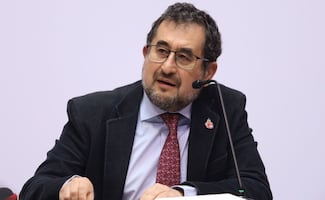Jeb Bush outlined plans to improve security of the nation's borders and enforcement of its existing immigration laws, calling both a requirement before any president could begin to address the status of the estimated 11 million people living in the country illegally.
"Finding a practical solution to the status of the people who are here illegally today is a nonstarter if our borders are not secure against future illegal immigration," the former Republican governor of Florida said in a statement, released ahead of Monday night's GOP candidate forum in New Hampshire and the party's first presidential primary debate later in the week.
A focus on border security as a pre-condition of any overhaul of the nation's immigration laws has become a common policy point among many of the Republican candidates for president.
But Bush's focus on this aspect of the debate is notable, given the months he has spent defending his support for creating a path to permanent legal status for those in the country illegally - a position that is deeply unpopular among the party's most passionate primary voters.
Many aspects of Bush's border security proposal, from creating "forward-operating bases" to increasing the use of drones and other technology to watch for drug and human traffickers, are not new. Several are already employed by federal authorities and they largely mirror those Bush suggested in his 2013 book "Immigration Wars," which he co-wrote with former U.S. attorney Clint Bolick.
Bush, who is fluent in Spanish, married to a Mexican immigrant and refers to his children as Hispanic, has largely taken a softer tone than most in the GOP field on immigration.
He has said those who come to the U.S. illegally do so as "an act of love" to make a better life for their families. Bush has also argued that resolving the nation's immigration debate is key to boosting the nation's economic growth, saying the country's legal immigration process should focus more on letting in workers the country needs rather than reuniting families.
Last week, he again rejected the idea that a resolution of the immigration debate should begin with the mass deportation of people who are now in the country illegally.
"The idea of self-deportation, of rounding people up, is not an American value," Bush said at a campaign stop in Florida. "Americans reject that idea."
Beyond the border, Bush said in his Monday proposal that the federal government must keep better track of foreign visitors, citing a 2006 report from the Pew Hispanic Center that found up to half the number of people here illegally have overstayed their visas.
"While we need to find a practical solution to the status of people who are here illegally today, as we secure the border going forward, we need to identify and send home the people who enter the country legally but overstay their visas or otherwise violate the terms of their admission," he said.
Such a reliable entry-exit visa system has so far proven elusive for Homeland Security officials.
U.S. Customs and Border Protection, the agency that secures the country's ports of entry, last month launched a pilot program to test handheld devices that scan the fingerprints of some foreign travelers as they leave the country from Atlanta's airport.
The tests will be expanded to airports in eight additional cities later this year. To run through next June, the tests are part of a congressional mandate to create a biometric exit system for foreign visitors. Such a program has been repeatedly delayed, with Homeland Security officials citing its exorbitant cost.
Bush's statement Monday also broadly discussed how he would deal with people currently living in the country illegally, requiring them to pass a criminal background check, pay fines and taxes, learn English, obtain "a provisional work permit" and get a job in order to obtain legal status.
The Democratic National Committee slammed Bush's plan. It is part of "the same Republicans playbook that divides families and hurts our economy," said Pablo Manriquez, the party's Hispanic Media Director, in a statement.
Noticias según tus intereses
[Publicidad]
[Publicidad]













